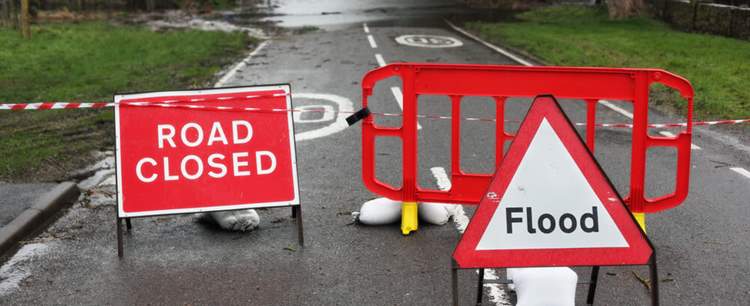Floods and Storms
The winter season never seems to end in the UK. With it, comes the worry about flooding to property in the wake of storms, and heavy rain.
Here at UKInsuranceNET, we’re looking into how flooding affects your property and the different ways you can minimise the damage. We’ll also cover what happens if you experience some flood damage.
Is my property at risk?
The first thing to find out is whether there’s a risk of flooding to your property. By visiting the Environment Agency website and entering your postcode, you may see whether you’re at low or high risk of flooding.
You may also ask the Environment Agency to search its records for any previous flooding of the property in question. The search is generally free of charge unless the agency spends more than 18 hours finding the answers to the questions you’ve asked.
What if it looks like my property could be flooded?
Weather forecasts on the radio and television are obvious sources of impending storms and the risk of flooding in certain areas.
Check online too for the government’s Flood Information Service. This service gives a five-day forecast of flood risks for the whole of England and Wales. It also gives daily flood warnings and notifies if you need to take immediate action.
You may even sign up to receive flood warnings by telephone or email. The Government provides this free of charge.
If you receive notification that a flood is possible, move your car to higher ground. Doing this will reduce the risk of damage.
You should also keep important documents (such as insurance policies, passports, and others) and valuables in sealed plastic bags on an upper floor.
What can I do to minimise the damage?
Steve Bradley, MD at property insurance specialists UKinsuranceNET, has some advice for property owners who are at risk.
He says: “While property insurance is designed to repair/replace water damage – Storm Desmond wreaked havoc in the UK and cost the country an estimated £5 billion. Homeowners need to be aware that flooding can do more than damage your home and contents.
“You may need to live elsewhere while the property is dried out and repaired. This can take many, many weeks. You may also lose old family photos or keepsakes that have been passed down to you. These have a sentimental value that can never be replaced”.
Mr Bradley adds: “Sadly, flooding is becoming a part of our seasonal cycle. Homeowners should look to see if their properties are becoming more at risk to suffer from flooding, then take precautionary steps to minimise its effect. That also, of course, includes making sure you have adequate insurance cover in case flood damage occurs”.
Flood Re was introduced to help homeowners in high-risk areas cope with high home insurance premiums. Despite this being available, many insurers may charge a high premium if your home has suffered flooding in the past.
What flood insurance should I purchase?
Many people encounter difficulties arranging insurance on a property that has been damaged by flooding in the past or is at risk of flooding in the future.
Flood insurance needs can differ with each homeowner, so we recommend getting in touch with one of our experienced advisors. We’re on hand to get you the best flooding insurance cover for your property.
What happens if my property experiences flooding?
When a major flood occurs, severe damage is often the outcome. Damage still occurs when warnings are issued in advance.
The prime concern is safety. With this in mind, the emergency services will be amongst the first to the scene and may recommend or require things like evacuation.
Once it’s clear that everyone is safe, the next top priority will be to restore things to as near normal as possible.
That may involve both work and expense for insurance policyholders. Understandably, they’ll expect their insurance provider to react as quickly as possible.
If you’re unfortunate enough to experience flood damage, then you’ll probably be contacted fairly quickly by someone called a “loss adjuster”.
What is a loss adjuster, and what do they do?
There is a widespread misconception that the loss adjuster’s role is to try and keep the claim levels down as low as possible for the insurer.
Professional loss adjusters never arrive after a flood with cost-management as their primary objective. They are there as the insurance provider’s on-site presence.
Their main purpose is to help policyholders resolve the problems that the flood has caused. These problems take into account damage to the property and the property holder’s lives.
Some of their advice relies upon local knowledge and an understanding of the wider flood effects. For example, they may be able to help you to find emergency tradespeople to come in and check that electrical and gas appliances are still operating safely.
Their focus is to help you get your life back to normal as fast as possible. In that capacity, they’re able to leverage widespread support services both from the insurer and sometimes other sources too.
They are also there to help you progress your claim as fast and efficiently as possible. A loss adjuster intends to finalise and settle things to your satisfaction, including agreeing and facilitating any final claim settlement payments.
A loss adjuster’s role is about behaving responsibly with money and not trying to somehow “squeeze down” legitimate claim values.
Hopefully, this has clarified aspects of their role and put your mind at rest. You have nothing to fear from the appointed loss adjuster!
Are you looking for flood insurance? Maybe you’ve got some questions about a policy, and you’d like to find out some more information? Get in touch with UKInsuranceNET today, and speak with our experienced team. Give us a call on 01325 346328







